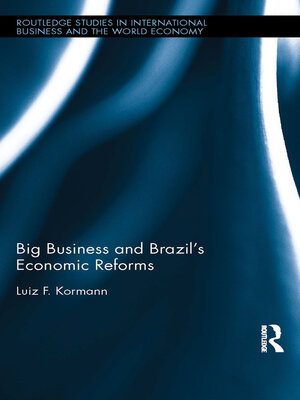Big Business and Brazil's Economic Reforms
ebook ∣ Routledge Studies in International Business and the World Economy
By Luiz Kormann

Sign up to save your library
With an OverDrive account, you can save your favorite libraries for at-a-glance information about availability. Find out more about OverDrive accounts.
Find this title in Libby, the library reading app by OverDrive.



Search for a digital library with this title
Title found at these libraries:
| Library Name | Distance |
|---|---|
| Loading... |
In the 1990s Brazil launched a comprehensive economic liberalization program. It lifted its trade barriers, adopted new market-oriented regulations, opened up its capital market and abandoned earlier efforts to internalize production and to build vertically integrated systems across several sectors of the economy. In spite of the visible gap that separated the top global giants from the large local enterprises, Brazilian companies seemed to be willing to join in an economic liberalization process that was bound to expose them to unprecedented levels of competition, bring about a high degree of uncertainty and, in many cases, ultimately put their own businesses at risk.
Big Business and Brazil's Economic Reforms examines the most emblematic aspect of the Brazilian economic reforms, the support from parts of the local entrepreneurial class for the opening up of the economy. It investigates the reasons why Brazil carried out these economic reforms in the 1990s, the transition process and the impact of the opening up of the economy on some of its most important sectors, such as the aerospace, auto and auto parts, food processing, oil and petrochemicals, ethanol, steel, telecoms and telecom equipment industries.
This book offers an in-depth analysis of Brazil's distinctive development paths, from the Latin American economic thinking of the early stages of its industrialization to the neo-liberal stance of the present day. It sheds new light on one of the main challenges facing all the large developing economies in their move to become more integrated into the world economy, the fostering of large enterprises, and is a great resource for students and researchers interested in global business, development economics, and Latin American economic history.







